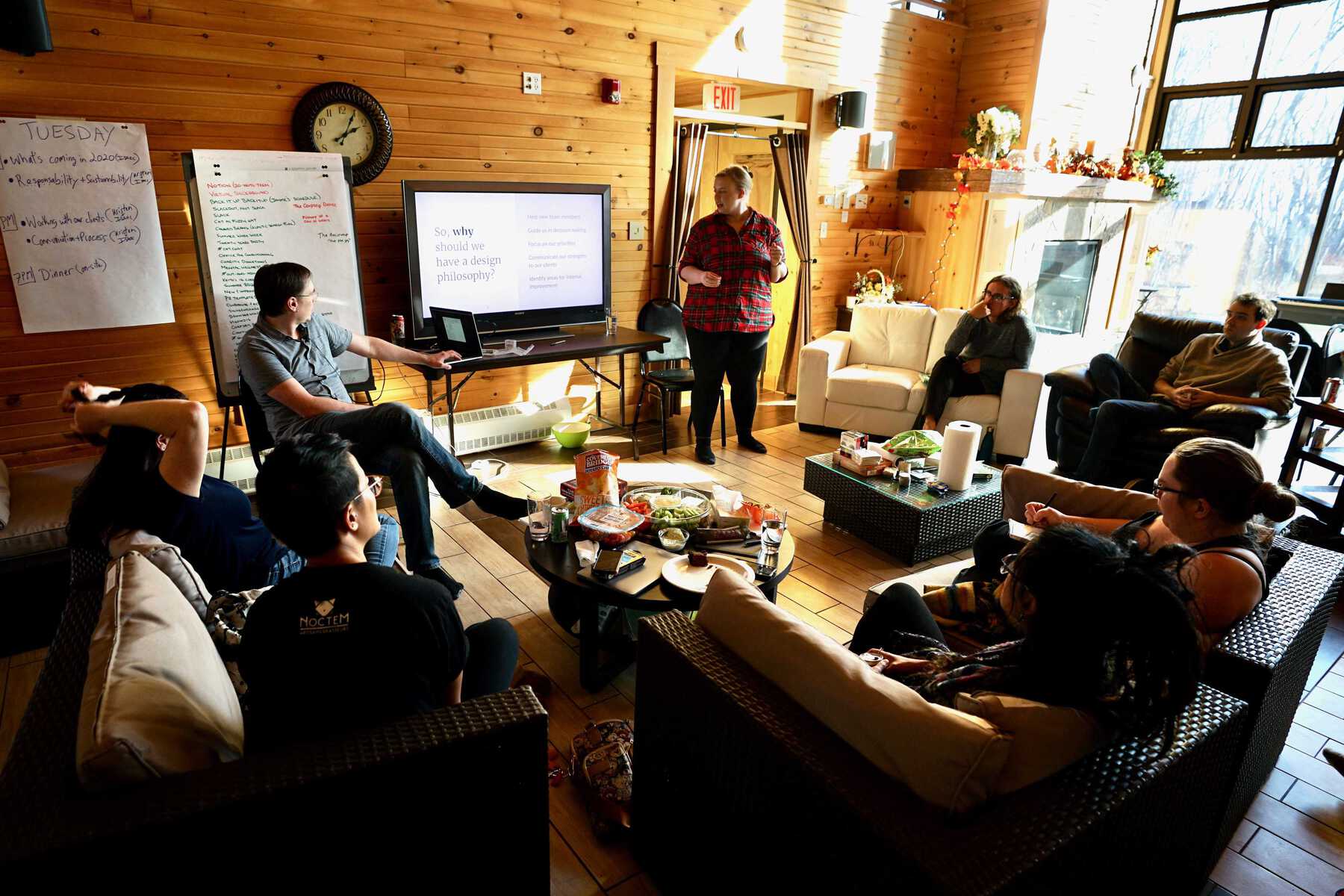Be kind.
We could follow the instruction as kids, so why aren’t more companies doing it?
Being kind isn’t new advice. In fact, we all learned the importance of kindness as kids. Whether it was showing appreciation with a thank you or playing with the new kid, it was the childhood golden rule. However, as we’ve grown up, trading play money for pay cheques, the instruction seems relegated to our personal lives and included as an afterthought in our careers.
Let’s face it, kindness doesn’t neatly track to an OKR and it’s much harder to codify “be kind” than “maximize profits” when making a business model.
Since our beginning 20 years ago, silverorange has been more about the personal than the professional. Given that we were started by a group of teens living at home, becoming super rich at breakneck speeds didn’t have to factor into the founder story. Instead, the company scaled up slowly, finding ways to grow the business while simultaneously figuring out what type of adults the founders wanted to be. Early on, we drafted our core message: “be a platform from which we can live interesting and fulfilling lives,” and it still holds up. Being kind factors heavily into that, and it’s the first lesson new slices read in our HR handbook.
Be Kind: The Short Version
Silverorange is an inclusive company, based on treating all individuals respectfully, regardless of gender or gender identity, sexual orientation, age, disability, nationality, ethnicity, religion (or lack thereof), or career path. We value respectful behaviour above individual opinions. Our team is an intentionally supportive group that recognizes and celebrates the creativity and collaboration of independent members and the diversity of skills, talents, experiences, cultures, and opinions that they bring to our company. Everyone at silverorange has the right to be treated fairly and with respect by everyone, and has a responsibility to treat others with the same consideration. Being kind toward your colleagues is key, but we also extend this to our clients and other external contacts, even (or especially) when we’re annoyed or stressed out by them.
The message sounds warm and fuzzy, but being kind isn’t all sunshine and rainbows. It means we have to test and challenge whether we are doing right by the people we are, the people we once were, and the people we want to become. It’s focusing on the lessons learned instead of fixating on the mistakes. It’s re-evaluating our humour and checking if everyone’s still laughing. It’s retiring well-meaning processes like board room video calls since remote workers find it hard to speak up and participate. Or anxiety parties that are supposed to alleviate stress but can trigger other issues. It’s making room for respectful debate so team members are empowered to express dissenting opinions and not feel singled out.
Silverorange isn’t a monolith, nor do we want to be. What was once a group of cis-white males from the same hometown has been transformed by the past three years of hiring. Now we proudly represent a diverse team including members of varying genders and gender expressions, sexual orientations, religious affiliations, ages, and ethnic backgrounds. Each member contributes their unique personality and life experience in a way that strengthens our company as a whole. Which is not to say our diversity work is done. The real work is educating ourselves on the ways we will still differ and ensuring people with those voices are set up to succeed. Inviting people to join a group where they aren’t already represented is a monumental (and sometimes dangerous) ask, and it’s doing a disservice to them if they’re just expected to trust us. We can’t promise we’ll do it perfectly, but we can promise we’ll do it kindly.
Throughout the past year we’ve learned how leaders in tech can champion one practice in public, but do another in private. At silverorange, we’ve found these simple practices have made us stay true to our word.

Be Kinder to Each Other
Express gratitude. It’s easy to take things for granted when we’re caught up in our individual work. Highlighting the wins each week, both as individuals and a company, helps remind us what we’re achieving as a team. It reminds us that even small or boring tasks are still valuable. Our clients contribute those compliments as well, which helps keep us motivated.
Focus on the positive. We all have struggles at work from time to time, whether that’s stress, struggling with something new, or our own personal issues. While there’s always a negative take to a situation, there’s usually a lesson to be learned. Even though trying to stay positive can initially feel contrived or inaccurate, the main point is to not dwell on the negative. Ruminating on how bad things are or could be is rarely useful… unless you’re doing risk analysis.
Give each other the benefit of the doubt. When deadlines loom and stress runs high, it’s tempting to attribute mistakes to malice or incompetence. Take a moment to cool down before you talk to your colleagues. Give each other the opportunity to change those assumptions.
Just listen. Receiving feedback is inherently uncomfortable, but critiquing can be just as hard, if not harder than receiving it. It’s emotional labour to identify the issue, plan a solution and deliver it in a way that will not risk the relationship. So if someone is working to help you improve, resist the urge to defend and actually hear them out.
Make room for new opinions. It’s naive to imagine we’ll always agree. As our team grows, we will hear other opinions rooted in personality, cultural or social differences. Sometimes that leads to conflict where someone feels they’re misunderstood or disempowered. In these moments, it’s important for both sides of that conversation to be human rather than be right.
Be allies and adapt for those that can’t ask for it. I enjoy introducing my coworkers to queerness and making silverorange adopt simple, inclusive practices like asking for pronouns and avoiding unnecessarily gendered language. However, there are a lot of lessons I can’t teach because they’re not my story to tell and education isn’t my job. As we continue growing, we’ll be able to add previously unrepresented voices to the mix, but we all need to speak up for those empty seats so they don’t have to do the heavy lifting.
Be Kinder to Others
Choose projects and clients that align with your values. Finding work personally or emotionally fulfilling can motivate you to get that project shipped. Given the chance, we would always choose work all twenty of us could get behind. That isn’t realistic, so our sales process invites any slice to speak up if the work would compromise personal or company values.
Stay on your client’s side. It’s easier to collaborate if you see your client as a teammate instead of an opponent. Avoid speaking negatively about them, and try to show empathy to their situation. Remember that you’re working towards the same goal. When issues arise, ask what both of you can do together to improve the situation instead of treating it like their problem.
Challenge clients to do more for their customers. We had a client challenge us to adopt broader accessibility practices and give us the opportunity to learn about inclusion. Because of that success, our team has chosen to incorporate low hanging fruit like colour contrast, semantic hierarchy and ARIA attributes into our best practices. We also advise our clients to simplify text in their privacy policies, terms of use, and other legal writing so they can collect informed consent. On a basic level, it’s the right thing to do. But if your clients still need convincing, it means their products can reach a wider audience.
Challenge our peers to do the same. As a bunch of introverts, networking has never been our forte. But as we’ve passed twenty years, we realize we actually have valuable insight to share. We’re active in the PEI dev and design community and try to teach others the benefits of diversity and inclusion. We participate in UPEI’s co-op program, by hiring summer students and sitting on hiring panels so students can practice their interview skills. We’ve been attending Montreal events for women and queers in tech, and have been inviting other agencies along.
Be Kinder to Yourself
Strive to do the best you can within reason. It’s admirable to have high standards, but make sure they are achievable. Talk to your managers and your coworkers to ensure that your expectations align with theirs.
Forgive yourself. We all inevitably slip. Planning and estimation isn’t a science, so sometimes you overpromise and underdeliver. Don’t beat yourself up over past mistakes. As long as you learned something from the experience, that lesson was worth it.
These suggestions will inevitably change with time. The way we express kindness evolves from day to day, from project to project, from person to person. We make missteps and we need to readjust with each new challenge. It’s a continuous process and a complicated equation to keep iterating on ourselves, but centring kindness as our guiding principle has been a fulfilling way to find community within our company and our industry.
